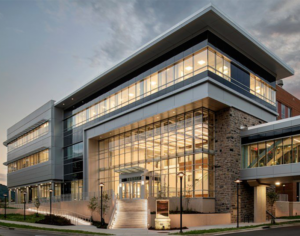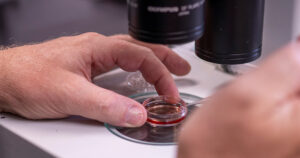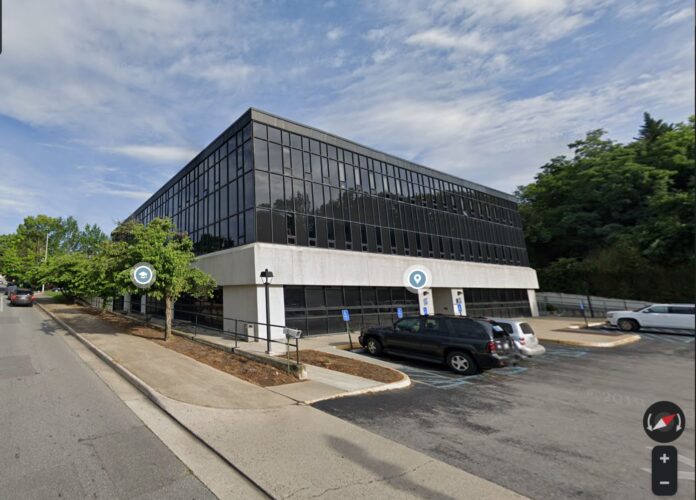Multiple public and private organizations are coming together to develop 40,000 square feet of lab space and business incubation programming in the innovation corridor.
The City of Roanoke, in partnership with Carilion Clinic, Virginia Tech Corporate Research Center, Verge, Fralin Biomedical Research Institute at VTC, and Virginia Western Community College, have announced a collaboration to build a biotechnology incubator in Roanoke.
The Virginia Department of Housing and Community Development approved the release of $15.7 million in funds awarded to the City of Roanoke to create 40,000 square feet of shared lab space. The project is a collaboration like no other for this region with partners that will build, manage, and develop programming in a building in the Roanoke Innovation Corridor.

“Roanoke is building a strong case for companies to look at this region and say, ‘This is a place where I want to be,’” said Marc Nelson, City of Roanoke Director of Economic Development. “We are excited that so many partners were able to come together to make this project a reality in a relatively short period of time.”
“We are thankful that state, local governments, and private partners share the same vision to build the next step in our trajectory,” said Brett Malone, president & CEO of the Virginia Tech Corporate Research Center. “Heavy investments between multiple partners have led to a tipping point for biotech in this region. This is a model that can scale across the Commonwealth to support the growth of Virginia’s biotech industry.”
The collaborative effort looks like this:
- The City of Roanoke will facilitate and manage the project and funds awarded through the state budget and contribute an additional $1.9 million match through American Rescue Plan Act funds.
- Labs will be constructed in a building currently owned by Carilion Clinic at 1030 S. Jefferson Street in Roanoke. Carilion Clinic Innovation, joined by physicians and care teams with novel ideas to advance healthcare, will use the space to further their concepts.
- The Virginia Tech Corporate Research Center will manage the facility’s planning, development and operations.
- Verge will launch an innovation studio and new programming to support our region’s early-stage biotech and digital health start-ups. Under the Verge alliance, the Roanoke-Blacksburg Technology Council will launch new talent programs to attract and retain technology and biotech talent, and RAMP will work closely with the start-ups for acceleration.
- Virginia Western Community College will expand its degree and certificate programs to cultivate and support the workforce needs of the growing biotechnology sector. VWCC also will provide professional development to K12 partners to enhance biotechnology education.
- Virginia Tech will continue to contribute to the growth of the biotechnology cluster with innovative faculty research and startup companies emerging from the Fralin Biomedical Research Institute at VTC and as an educator of physician thought leaders with biomedical research emphasis at the Virginia Tech Carilion School of Medicine.
The collaborative effort brings together cross-jurisdictional, public and private partners to propel growth in the rapidly expanding biotechnology cluster.
“The shared lab space will attract existing and start-up businesses in the life sciences, biotechnology and healthcare sectors,” said Carilion President and CEO Nancy Howell Agee. “But the space is one small step. Most importantly, the building will be an innovative gathering place for our region’s greatest minds to collaborate with those who have promising new ideas about exciting and challenging projects.”
 “This will be a magnet to attract biotechnology companies including those that spin out from the research institute,” said Michael Friedlander, Virginia Tech vice president for health sciences and technology and executive director of the Fralin Biomedical Research Institute at VTC. “These companies want to interact with R1 research universities such as Virginia Tech and health systems such as Carilion Clinic. Wet lab space is in short supply in Virginia, so this will also address an important requirement of biotech companies in the Commonwealth and well beyond our region.”
“This will be a magnet to attract biotechnology companies including those that spin out from the research institute,” said Michael Friedlander, Virginia Tech vice president for health sciences and technology and executive director of the Fralin Biomedical Research Institute at VTC. “These companies want to interact with R1 research universities such as Virginia Tech and health systems such as Carilion Clinic. Wet lab space is in short supply in Virginia, so this will also address an important requirement of biotech companies in the Commonwealth and well beyond our region.”
“The forward thinking that’s happening here to link education at all levels to start-ups and business commercialization with the infrastructure to do it is pretty outstanding,” said Amy White, Dean of Science, Technology, Engineering and Mathematics at Virginia Western Community College. “This project is a model of how to ensure that we are growing a comprehensive plan for talent and business development that keeps people and jobs in this region.”
An innovation studio and expanded acceleration programming will be designed to incorporate wrap-around services for companies to help them grow with more agility within the space of this facility. Verge, RAMP and the Roanoke-Blacksburg Technology Council will create and host these programs. More than a building, this space will be designed as a connector for the biotech community with multiple resources in one place and a location central to Carilion, Fralin Biomedical Research Institute at VTC, the Virginia Tech Carilion School of Medicine, and Virginia Western Community College.
The incubator is the next step to provide a home for companies commercializing research throughout the region.
“This space is a way to help incubate local research talent and start-ups as well as attract life sciences professionals and companies from outside the region,” said Erin Burcham, president of Verge and executive director of RBTC. “We are excited to announce the launch of a new innovation studio and programming for early-stage biotech companies. With support from the Commonwealth of Virginia and the City of Roanoke, we are positioning the region to be a hub for life science companies to grow and thrive here.”
The project builds on a GO Virginia-funded project that identified the need for lab space, access to industry experts and mentoring in the biotechnology sector. Additional GO Virginia funds funded the construction of a pilot labs facility in Blacksburg. The mission is to create a deeper network of life science-specific investment capital.
“We started with a life sciences feasibility study that led into an infrastructure project to meet demand from biotechnology companies and support the commercialization of our region’s research,” Malone said. “This facility, as well as the labs in Blacksburg, provide the necessary capacity and access to collaborations with companies such as Johnson & Johnson Innovation for researchers here.”
The project is expected to generate 250 jobs in the first five years after opening. Construction is slated to start in 2023, with the labs expected to open in late 2024.

